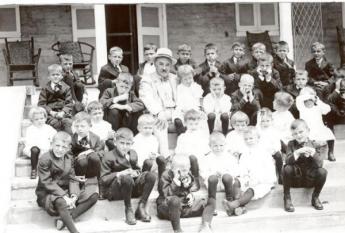Related Topics
Religious Philadelphia
William Penn wanted a colony with religious freedom. A considerable number, if not the majority, of American religious denominations were founded in this city. The main misconception about religious Philadelphia is that it is Quaker-dominated. But the broader misconception is that it is not Quaker-dominated.
Indigents
With a long history of welcoming and assisting the poor, Philadelphia has always risked swamping the lifeboat by attracting more of them than it can handle.
Dislocations: Financial and Fundamental
The crash of 2007 was more than a bank panic. Thirty years of excessive borrowing had reached a point where something was certain to topple it. Alan Greenspan deplored "irrational exuberance" in 1996, but only in 2007 did everybody try to get out the door at the same time. The crash announced the switch to deleveraging, it did not cause it.
Cultural
Culture and Traditions (2)
Customs, Culture and Traditions (2)
.
Right Angle Club: 2013
Reflections about the 91st year of the Club's existence. Delivered for the annual President's dinner at The Philadelphia Club, January 17, 2014.
George Ross Fisher, scribe.
Adoption

|
| Peter Conn |
Peter Conn, a member of the Franklin Inn of Philadelphia, is recently retired from the University of Pennsylvania. Since he has adoption in his family, he became curious about the matter, found that almost nothing has been written about the history of this topic, and decided to write a book about it himself. At a recent monthly meeting of the club, he described his findings, which are pretty surprising.
In a vague sort of way, everyone's general readings do confirm his findings that adoption was frequent among the American Indians, and also among the ancient Romans. In early 6th century Europe, however, it seems to have died out, only to return as a common experience in the 16th century. The first American law that Dr. Conn could find establishing the rules and legal conditions of adoption was passed in Massachusetts in the 19th century, at roughly the time American states were passing laws forbidding abortion. Whether there is a connection between the two movements or not is speculative. However, it does seem pretty likely that our current perceptions about adoption are surprisingly recent, reflecting a strong likelihood that Roman and Indian traditions have nothing to do with it, but fairly recent history might well have a lot to do with it.
Just a little reflection about all the stories we read, alluding to orphanages, foundlings, wards, primogeniture, romantic love, choices of marriage partners, and the like, quickly confirm a realization that conditions and attitudes about reproduction must have changed a very great deal, and fairly recently. It was not very long ago that children were apparently so numerous they could be treated as expendable. Considering how dangerous childbirth has been until recently, current attitudes about "valuable babies" , motherhood, and even the role of women in society must be evolving quickly without our realizing it, and in directions so recent they may well require further revision. Just whose views are old fashioned and whose views reflect modern insights are both judgments we probably should classify as tentative for at least a few more decades.
For example, the dates of major changes in attitudes about foundlings inevitably generate reflections about the attitudes of the Catholic Church. That ancient organization probably has enough troubles with bedroom issues, without adding this one. But the coincidence of the dates with the rise of the Church in Europe, and the subsequent rise of Protestantism, inevitably generate questions about Church attitudes as the cause, or possibly some sociological changes in society which transform both church and reproductive attitudes at the same time. What were the roles of the Crusades, and the Arab invasion of Europe, or the Ottoman invasion? Or the black plague and the white plague, or the Industrial Revolution? We have to know more about these cataclysmic events in order to have even a small idea of whether they might have influenced each other.

|
| Milton Hershey founded the Hershey Industrial School |
It makes a lot of difference whether a culture needs agrarian workers or not, to understand why "the best interests of the child" should only recently have been established as a legal basis for oversight of contested adoptions. Or why inheritance by adoptive children has only been such a recent phenomenon, endorsed by law. What happened to cause the abandonment of all the orphanages we used to have? Why have we chosen to split the issue between adoption and foster care, and treat the two so different? Where do the Girard College and the Hershey School fit into this transition? Why do the Russians feel they are injuring America by forbidding American adoption of Russian orphans?
And get this: during the 19th century in America, when there was a surplus of women on the East Coast resulting from a massive migration of males to the West, about 250,000 American orphans were packed on various trains and sent West. We are told they stopped at a station and let the local settlers select a few, and then the train continued going West, letting off more and more adoptees until they were all gone. Transcontinental railroads were only built after the Civil War, so this sort of child disposal was not more than a century before the political battles of Roe v Wade. We have a lot to learn, and probably a lot to be humble about. So let's not bury the truth under a mountain of political correctness, but let's not have any witch-hunts, either.
REFERENCES
| Adoption: A Brief Social and Cultural History: Peter Conn: ISBN:ISBN-13: 978-1137332202 | Amazon |
Originally published: Monday, March 18, 2013; most-recently modified: Thursday, April 25, 2019